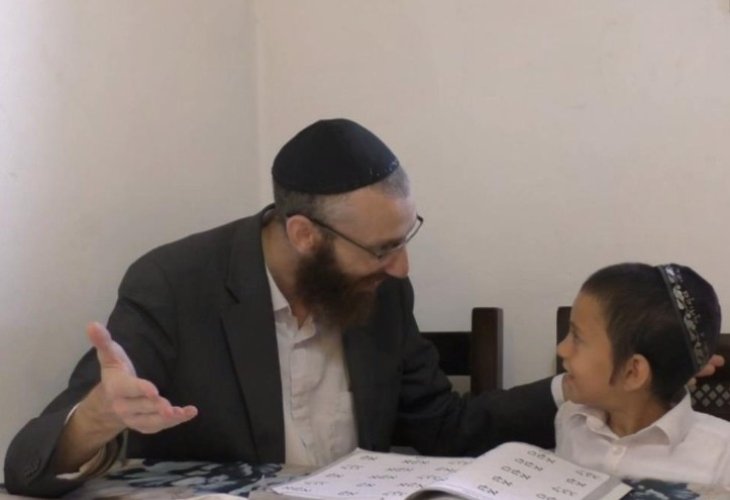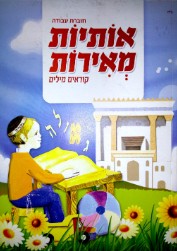Netanel Ziss: 'Children Who Struggled with Reading for Years Suddenly Start to Read'
Years of teaching inspired Netanel Ziss to develop a unique reading method based on Jewish principles to help children overcome reading difficulties. He shares how this approach changes lives.

"My daughter is already in fifth grade, yet she still struggles with reading." The woman who approached Netanel Ziss, an expert in reading development and child empowerment, seemed desperate. "What haven't we tried?" she said in frustration, "How much money we've spent on tutors, various methods, but something must be stuck. My child isn't getting it; her reading is imprecise and the pace is incredibly slow."
This conversation took place about two months ago after Netanel finished delivering a workshop in Bnei Brak, where he offered tips and advice for parents ready to assist their child in overcoming difficulties and starting to read well and enjoyably. "I explained to this woman about the method I propose," he says, "and also emphasized what I stress to everyone who approaches me – as a mother, it isn't enough that she sends her daughter to tutors. She herself must engage in the mission of reading instruction, and no more than five minutes daily is needed."
This week, he received the long-awaited phone call from her. "My daughter is reading," she told him excitedly, "and you were right. Just when I sat with her for five minutes every day, I managed to spot the missing link. It turned out she knows the letters well, but the vocalization perplexes her. Once we focused on the vocalization, her reading skills improved miraculously."

Every Child Has a Chance
Netanel entered the field of reading instruction after more than 15 years in education, having met countless students with learning difficulties, many of whom struggled with reading. "Every time it hurt my heart to realize that so many children find reading difficult. Some are children with learning disabilities or belong to special education, but there are also very many from regular education who excel in other areas, yet when it comes to reading, something gets stuck and just doesn't resonate."
Netanel notes that approximately 30% of children in kindergartens and regular education face learning challenges, with many struggling with reading. According to him, today you can see these children almost in every family, and in recent years the phenomenon has become surprisingly common.
"This direct contact with children struggling led me to research the subject and try to understand why children find it so challenging. I felt that since Hebrew is the holy language, a language the child encounters frequently in life when praying or blessing, it should be easier for them to grasp its reading, and how could it be that specifically in Hebrew there is more difficulty compared to other languages? I also felt that it couldn't be that Hashem created a language that children can't succeed in reading. From this point, I set out to learn the subject. I researched a lot and reached many sources dealing with reading instruction. Finally, I managed to develop a unique method that doesn't rely on lessons taught at school or by integrated and tutoring teachers but is imparted by parents to their children through structured daily learning of five minutes. "The method is suitable for children from kindergarten age and up", he emphasizes, "There are also yeshiva students who struggled with serious reading difficulties for years; they hid it, but because of the method I developed, they managed, thank Hashem, to get on the right path."
You're talking about children who must have tried every existing method, what's unique in your approach that isn't in others? Why does it succeed?
"The explanation is complex and can't be fully detailed in one article," replies Netanel, "but one thing I can emphasize – while developing the method, I utilized a lot of sources from Judaism related to language acquisition. It was important for me to base the method on principles found in the Torah itself, and it turned out that there are quite a few methods and ways stemming from Judaism. That's how I managed to find many educational techniques and develop them in a way that suits acquiring reading very quickly."
The interesting thing about the method, he says, is that it completely resembles the learning method that was taught in cheders and Talmud Torahs in the past. "I'm not suggesting anything new that hasn't been until now; on the contrary, I rely on past learning ways. I feel there's a very broad foundation behind me."
To illustrate, he gives an example: "The Hebrew language is known to be divided into letters and points. According to Judaism, the letters are distinct from the points, meaning – there are the letters themselves and there is the vocalization. In educational institutions across the country, this is ignored. Today, it is common to teach children based on sound – they teach them that when they see an Aleph with a Segol underneath, they hear the sound 'Eh,' but hardly mention the names of the vowels, instead treating them as an inseparable part of the letter. My method is based on Judaism, according to which there is Aleph and there is Segol, and when we combine them, the syllable 'Eh' is formed. I've found that children understand things better this way, remember the sound better, and also feel more connected to the holiness of the letters."
How long does it take on average to acquire reading skills after starting the method?
"If the parent dedicates themselves to the child, truly follows the precise instructions of the method, and studies with them diligently for five minutes daily, within two to three months the child should be reading well," Netanel asserts.

"The Jump Comes Thanks to the Parents"
These days, when most children are at home, and it's clear that even when they return to schools, tutoring and integration classes won't resume regularly, many parents approach Netanel, eager to hear about the workshop so they can advance their children with it.
"Once parents get involved, success is almost guaranteed," he emphasizes, "because not only do they see the child daily and can identify their exact difficulty, and on the other hand – their progress, even if small, but they also have a tremendous desire to advance them. This is something that will never exist in any teacher. Only parents have such tools. Personally, I've seen so many children who struggled for years, but once the parents got involved, they truly experienced a real leap forward."
Practically, how do you acquire the method?
"I offer learning the method through a comprehensive online course. In the course, I explain the outlook and idea behind the method, the approach we come from, and the way reading is imparted. Anyone can participate in the course at their convenient hours and watch it from their personal computer. Additionally, over the years, I've seen that parents request personalized and guided instruction in addition to the workshop, so I offer the option of meeting the child once to identify the barriers causing the difficulty. Sometimes these are emotional barriers, and at other times these are learning disabilities of various kinds. Based on this, I design a precise learning plan for them. The parent receives close guidance from me, and thus begins 'the learning project' with the parent and child's cooperation and desire. Additionally, I ask the parent to record the child every few days while they read so I can check the progress. This way, the program is very consistent, progressing to complete success with Hashem's help."
Netanel Ziss's course can be purchased through the 'Jewish Campus.' https://campus.hidabroot.org/course/177

